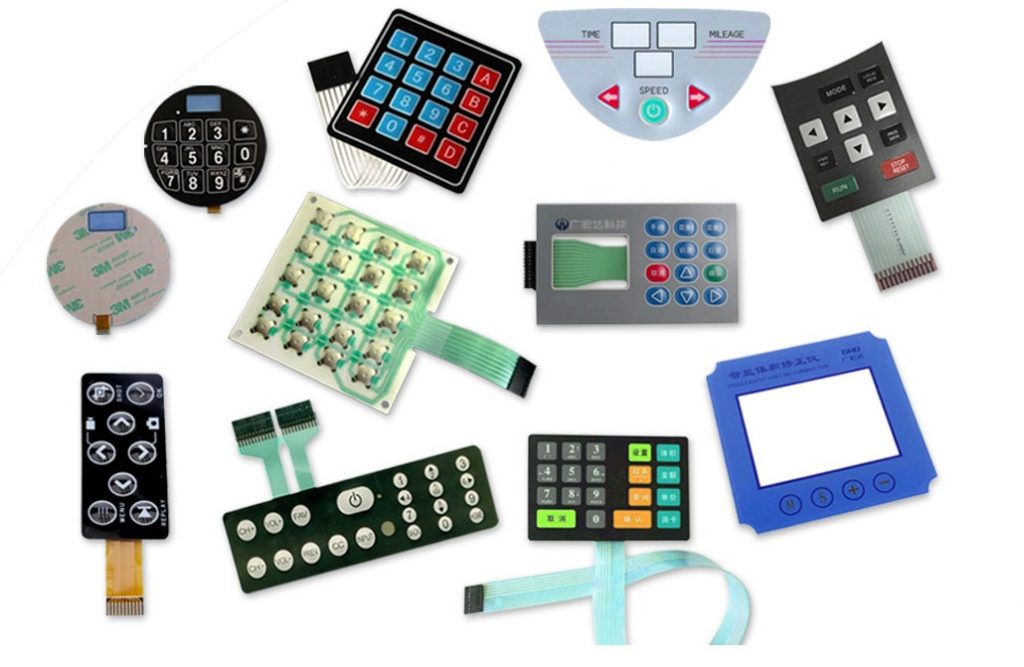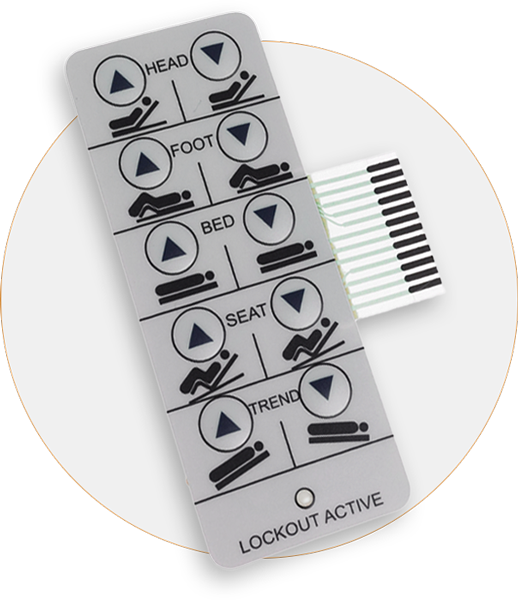Understanding the Significance of Membrane Switch in Modern Electronic Devices and Their Applications
Membrane switches over act as a vital component in contemporary electronics, using a reliable user interface for individual interaction. Their light-weight and adjustable nature makes them suitable for a series of applications across varied markets. Comprehending their crucial components and advantages can offer understandings right into their expanding importance. As technology continues to breakthrough, the advancement of Membrane switches over elevates inquiries regarding their future applications and style developments. What lies in advance in this dynamic field?

What Are Membrane Buttons?
Membrane switches are crucial elements in modern electronic devices, serving as interface that promote communication between devices and individuals. These switches contain a number of layers, including a graphic overlay, a glue layer, and a circuit layer, every one of which interact to produce a practical and durable user interface. The style permits a flat, inconspicuous solution that can be personalized concerning dimension, shape, and aesthetic appearance, making them appropriate for various applications, from customer electronics to medical tools. The tactile comments provided by Membrane switches over improves user experience, while their resistance to dust and moisture makes them perfect for testing environments. In addition, Membrane switches can include features such as backlighting and published graphics, further broadening their use. Their adaptability and robustness make them a preferred option in sectors where dependability and simplicity of usage are critical, eventually adding to the smooth procedure of contemporary electronic devices.
Key Parts of Membrane Changes
While various elements add to the capability of a membrane switch, three primary layers play substantial roles in its design and operation. The top layer, normally made from a sturdy polymer, functions as the interface for user communication, usually including published symbols and graphics. Underneath this is the spacer layer, which preserves the required distance in between the top layer and the circuit layer. This spacer layer guarantees that the switch activates only when pressed, preventing unintended inputs. Ultimately, the circuit layer consists of conductive traces that finish the electrical circuit when the top layer is dispirited. These traces can be made from numerous products, including copper or silver. Together, these parts produce a dependable and robust tool that is portable and flexible, suitable for a variety of electronic applications, from house home appliances to medical devices. Recognizing these essential parts is crucial for appreciating the overall functionality of Membrane switches.
Advantages of Making Use Of Membrane Changes

Membrane Switch Production Refine
Comprehending the Membrane button production procedure exposes the complex actions included in producing these crucial elements. The procedure commonly begins with the layout phase, where layouts and specifications are created using specialized software. Following this, the graphic overlay is published on a versatile substratum, frequently making use of high-resolution printing techniques to ensure clarity and precision.Next, the sticky layers are used, which serve to bond the numerous parts together. The circuit layers, made from conductive inks or materials, are then published onto a separate substratum. These layers are carefully lined up and laminated to develop a functional switch.After assembly, the buttons undertake testing to confirm capability and longevity. Quality assurance measures are carried out throughout the procedure to determine and remedy any defects. Ultimately, the completed Membrane buttons are packaged and gotten ready for circulation, ready to meet the demands of modern-day digital applications.
Applications of Membrane Switches in Numerous Industries
Membrane buttons are significantly made use of throughout numerous industries, especially in clinical devices and customer electronic devices. In the medical area, they provide trusted control user interfaces for devices that need accurate operation. In consumer electronic devices, these switches improve user interaction by offering sleek and responsive interfaces.
Medical Devices Control
Many contemporary clinical tools utilize Membrane switches for streamlined procedure and improved individual communication. These switches provide a reputable, sturdy interface for a range of applications, including analysis tools, person monitoring systems, and medical instruments. Their customizable layouts enable details layouts that can visit this page fit the distinct requirements of health care specialists, guaranteeing intuitive navigating and effective access to necessary functions. Furthermore, Membrane buttons are resistant to impurities, making them appropriate for sterilized environments. The responsive feedback they use can boost customer confidence, lowering the risk of errors during important clinical treatments. On the whole, the combination of Membrane buttons in clinical tools substantially adds to boosted functional effectiveness and individual safety in medical care setups.
Consumer Electronic Devices Interfaces
In the domain of customer electronics, Membrane buttons play a crucial duty in boosting interface across a broad array of gadgets. These switches are essential to products such as remotes, microwaves, and gaming consoles, giving a user-friendly and efficient interface. Their design enables for a seamless assimilation of graphics and performance, enabling suppliers to develop sleek, modern aesthetic appeals without compromising use. Membrane buttons are additionally known for their durability, often standing up to comprehensive usage and direct exposure to various ecological problems. Furthermore, they can include attributes like backlighting and tactile feedback, further improving the individual experience. As customer needs for advanced yet user-friendly interfaces grow, Membrane switches over remain to be an essential element in advancing electronic gadget performance.
Style Factors To Consider for Membrane Changes
Designing reliable Membrane switches over calls for careful interest to various variables that affect both capability and individual experience. One crucial consideration is the choice of products, as they can influence resilience, tactile feedback, and visual charm. Picking an ideal adhesive is essential for ensuring long-term attachment and resistance to environmental factors.In enhancement, the layout and layout of the button should suit customer interaction, with switch sizes and spacing optimized for ease of usage. The consolidation of graphics and labeling need to prioritize clearness and presence under various lights conditions.Consideration of electrical attributes, such as actuation pressure and button level of sensitivity, will certainly enhance the responsiveness of the Membrane button. Moreover, the style ought to accommodate producing procedures to assure cost-effectiveness and timely production. Generally, a well-thought-out style enhances both the individual and the functionality experience of Membrane switches in modern-day electronics.

Future Patterns in Membrane Switch Modern Technology
As technology remains to progress, Membrane switches are poised to integrate new advancements that will certainly improve their capability and application in numerous areas. One significant trend is the incorporation of long lasting and flexible materials, which will certainly raise the lifespan and dependability of these buttons. Boosted surface appearances and personalized graphics are likewise anticipated, enabling even more instinctive user interfaces.Moreover, the integration of wise innovation, such as touch-sensitive surface areas and haptic comments, is anticipated to improve individual communication, making Membrane changes much more engaging and receptive. Additionally, breakthroughs in printed electronic devices will certainly allow much more complicated circuitry within thinner accounts, even more expanding design possibilities.Sustainability will certainly additionally play a vital function in future advancements, as manufacturers explore eco-friendly materials and production procedures. Generally, these fads will assure that Membrane switches stay appropriate and crucial in an interconnected and increasingly digital globe.
Regularly Asked Inquiries
Exactly How Do Membrane Switches Contrast to Conventional Mechanical Switches?
Membrane switches over offer advantages over typical mechanical switches, including reduced size, lighter weight, and boosted resilience. They typically provide a secured surface, improving resistance to dirt and dampness, making them perfect for varied applications.
What Products Are Commonly Made Use Of in Membrane Switch Construction?

Can Membrane Switches Over Withstand Extreme Environmental Conditions?
Membrane buttons can withstand extreme ecological problems, depending on their layout and materials. Premium buildings my link frequently include durability against temperature level fluctuations, moisture, and exposure to chemicals, making them suitable for numerous demanding applications across sectors.
The Length Of Time Do Membrane Switches Over Commonly Last Before Failing?
Membrane switches over generally display a lifespan ranging from 1 to 10 million actuations, depending on aspects such as usage frequency, ecological problems, and manufacturing top quality. Routine upkeep can prolong their resilience and operational reliability substantially.
Are Membrane Switches Over Personalized for Particular Applications?
Membrane buttons are without a doubt customizable for specific applications. They can be tailored in size, functionality, and layout, allowing makers to meet special user requirements and improve item appearances while preserving functional efficiency and resilience. Membrane switches are important parts in modern-day electronic devices, serving as individual interfaces that assist in communication between tools and users. The tactile comments supplied by Membrane switches improves customer experience, while their resistance to dust and moisture makes them suitable for testing environments. The consolidation of graphics and labeling must prioritize clearness and presence under various lighting conditions.Consideration of electric attributes, such as actuation pressure and button sensitivity, will enhance the responsiveness of the Membrane switch. Improved surface area appearances and personalized graphics are likewise expected, allowing for even more instinctive user interfaces.Moreover, the combination of wise innovation, such as touch-sensitive surfaces and haptic responses, is anticipated to boost user interaction, making Membrane switches over more receptive and appealing. Membrane switches over offer advantages over standard mechanical buttons, consisting of reduced size, lighter weight, and discover here improved toughness.